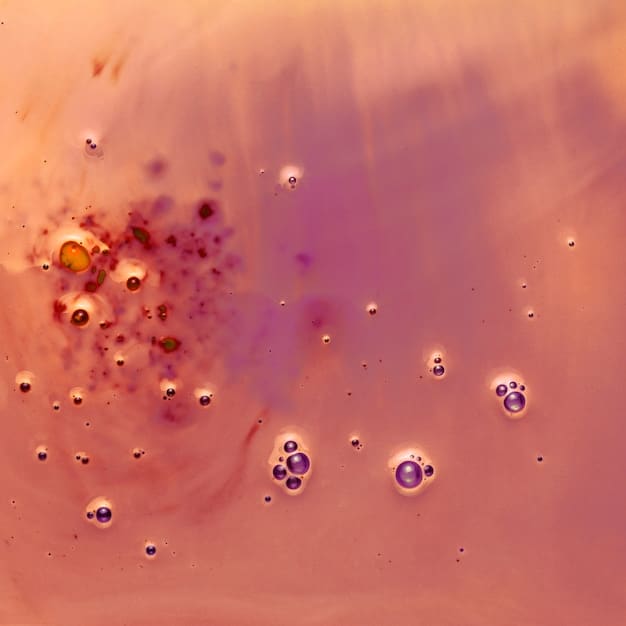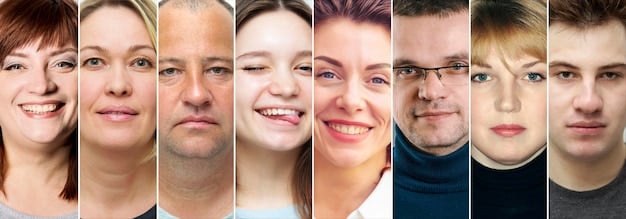The Power of Sleep: How 7-8 Hours Boosts Skin & Hair Health

Achieving optimal beauty begins with adequate rest; consistent sleep of 7-8 hours per night is crucial for cellular regeneration, hormone balance, and DNA repair, directly enhancing skin vitality and hair strength through improved blood flow and reduced stress.
In our relentless pursuit of radiant skin and lustrous hair, we often overlook one of the most fundamental and potent beauty elixirs available to us: sleep. More than just a period of rest, the hours we spend in slumber are a critical time for our bodies to repair, rejuvenate, and restore, profoundly impacting our dermatological and follicular health. This article explores The Power of Sleep: How Getting 7-8 Hours of Sleep Can Improve Your Skin and Hair, delving into the science behind this often-underestimated beauty secret.
The Science of “Beauty Sleep”: Cellular Repair and Regeneration
The concept of “beauty sleep” is far from a myth; it’s a physiological necessity. During deep sleep, our bodies enter a crucial phase of cellular repair and regeneration. This isn’t just about feeling rested; it’s about active reconstruction at a microscopic level, directly benefiting our largest organ, the skin, and our hair follicles.
One of the primary mechanisms at play is the release of human growth hormone (HGH). While often associated with muscle growth and overall development, HGH is also vital for skin and hair health. It stimulates cell reproduction and regeneration, repairing daily damage, from UV exposure to environmental pollutants. Without sufficient HGH, this repair process is compromised, leading to accelerated signs of aging and weakened hair structures.
Collagen Production and Skin Elasticity
Collagen, the protein responsible for skin’s firmness, elasticity, and youthful appearance, is actively produced during sleep. A lack of sleep can inhibit this vital process, leading to a breakdown of collagen and elastin, the very scaffolding that keeps our skin smooth and supple. This accelerated degradation manifests as fine lines, wrinkles, and sagging skin.
- Adequate sleep promotes the synthesis of new collagen molecules.
- It helps maintain skin’s elasticity, preventing premature aging.
- Improved skin density reduces the appearance of existing wrinkles.
Enhanced Blood Flow and Nutrient Delivery
During slumber, blood flow to the skin significantly increases. This enhanced circulation ensures that vital nutrients, oxygen, and growth factors are efficiently delivered to skin cells and hair follicles, promoting their health and vitality. Conversely, insufficient sleep restricts this blood flow, leaving skin looking dull, sallow, and hair appearing brittle and lifeless.
This nocturnal surge in circulation also aids in the removal of cellular waste products and toxins that accumulate during the day. Think of it as a nightly detox for your skin and scalp, flushing out impurities that can otherwise contribute to breakouts and inflammation. A well-nourished and cleansed environment is foundational for both vibrant skin and strong, healthy hair.
The Hormonal Harmony: How Sleep Balances Your Skin and Hair
Sleep plays a pivotal role in regulating our hormonal balance, and this equilibrium profoundly impacts our skin and hair. Disruptions in sleep patterns can throw these delicate hormonal systems into disarray, leading to a cascade of negative effects that manifest externally.
Cortisol, often known as the “stress hormone,” is a prime example. Chronic sleep deprivation elevates cortisol levels, which can trigger inflammation throughout the body. In the skin, this generalized inflammation can exacerbate conditions like acne, eczema, and psoriasis, making them more persistent and severe. High cortisol also breaks down collagen and hyaluronic acid, further compromising skin integrity and hydration.
Melatonin: The Nightly Antioxidant
Melatonin, primarily known for regulating our sleep-wake cycle, is also a powerful antioxidant. Our bodies produce melatonin in greater quantities during the night, especially in darkness. This hormone helps combat free radicals, which are unstable molecules that damage cells and contribute to premature aging.
- Melatonin protects skin cells from oxidative stress.
- It contributes to DNA repair, crucial for healthy skin and hair.
- Sufficient sleep ensures optimal melatonin production, enhancing its protective benefits.
Insulin Sensitivity and Glycation
Poor sleep can also lead to decreased insulin sensitivity, meaning your body struggles to process glucose effectively. This can raise blood sugar levels, contributing to a process called glycation, where sugar molecules attach to proteins, including collagen and elastin, making them rigid and less functional. Glycation stiffens these vital skin proteins, leading to wrinkles and a loss of elasticity, making the skin appear older.
Hormonal imbalances can also affect hair growth cycles. Thyroid hormones, for instance, are critical for hair follicle function. Sleep deprivation can disrupt thyroid function, potentially leading to hair thinning or loss. Similarly, imbalances in androgens (male hormones present in both sexes) can contribute to issues like excessive oil production in the scalp and hormonal acne, both of which are exacerbated by insufficient sleep.
Beyond Beauty: Sleep’s Impact on Overall Skin and Scalp Health
The benefits of adequate sleep extend beyond aesthetics, profoundly influencing the overall health and resilience of your skin and scalp. Sleep is not merely about looking good; it’s about fostering a healthy biological environment where skin and hair can thrive, warding off common ailments and enhancing their natural protective functions.
During sleep, the skin’s barrier function is strengthened. The outermost layer of our skin, the stratum corneum, acts as a protective shield against environmental aggressors, pathogens, and moisture loss. Sleep deprivation compromises this barrier, leading to increased transepidermal water loss (TEWL), resulting in dehydrated, flaky skin that is more susceptible to irritation and infections.

Reduced Inflammation and Breakouts
As discussed, lack of sleep elevates cortisol, which fuels inflammation. This inflammation is a key driver in various skin conditions, including acne. Insufficient rest can trigger increased sebum production, leading to clogged pores and more frequent breakouts. Additionally, inflamed skin takes longer to heal, meaning existing blemishes linger longer and are more prone to scarring.
- Consistent sleep helps regulate inflammatory responses in the body.
- Lower inflammation reduces incidence and severity of acne breakouts.
- Promotes faster healing of skin imperfections.
Scalp Health and Hair Follicle Function
A healthy scalp is the foundation for healthy hair. Sleep deprivation can lead to an inflamed, itchy scalp, and even dandruff, as the skin barrier of the scalp becomes compromised. The increased circulation during sleep also benefits hair follicles directly, ensuring they receive the necessary nutrients for robust growth. Well-nourished follicles produce stronger, thicker hair strands that are less prone to breakage and shedding.
Furthermore, sleep deprivation can impact the microbiome of the skin and scalp. A healthy microbiome, consisting of beneficial microorganisms, is essential for maintaining skin immunity and preventing overgrowth of harmful bacteria or fungi. When sleep is insufficient, this delicate balance can be disturbed, potentially contributing to scalp issues and dermatological concerns like folliculitis.
The Daily Ritual: Implementing Healthy Sleep Habits for Maximum Benefit
Understanding the “why” is crucial, but implementing the “how” is where the real transformation begins. Achieving that elusive 7-8 hours of quality sleep isn’t always easy in our fast-paced world, but consistent, intentional effort can lead to remarkable improvements in your skin and hair health, not to mention your overall well-being.
Establishing a consistent sleep schedule is perhaps the most impactful change you can make. Going to bed and waking up at the same time each day, even on weekends, helps to regulate your body’s natural circadian rhythm. This promotes a more efficient and restorative sleep cycle, optimizing those crucial hours for cellular repair and hormonal balance.
Optimize Your Sleep Environment
Your bedroom should be a sanctuary for sleep. This means making it dark, quiet, and cool. Even small amounts of light can disrupt melatonin production. Consider blackout curtains, earplugs, or a white noise machine if needed. The ideal temperature for sleep is typically between 60-67°F (15-19°C), as cooler temperatures facilitate the body’s natural dip in core temperature necessary for sleep onset.
- Ensure the room is as dark as possible to promote melatonin release.
- Minimize noise disruptions with earplugs or white noise.
- Keep the room cool and well-ventilated for optimal comfort.
Mind Your Habits: Pre-Sleep Dos and Don’ts
What you do in the hours leading up to bedtime significantly impacts sleep quality. Avoid caffeine and alcohol, especially in the late afternoon and evening. While alcohol might initially make you feel drowsy, it disrupts the later, more restorative stages of sleep. Similarly, heavy meals close to bedtime can interfere with digestion and keep you awake.
Screen time is another major culprit. The blue light emitted from phones, tablets, and computers suppresses melatonin production, signaling to your brain that it’s still daytime. Aim to power down all electronic devices at least an hour before bed. Instead, consider relaxing activities like reading a physical book, taking a warm bath, or practicing gentle stretches or meditation.
Addressing Common Sleep Disruptors and Their Skin/Hair Repercussions
Even with the best intentions, various factors can disrupt our precious sleep, and understanding these can help you mitigate their negative effects on your skin and hair. From stress to medical conditions, identifying the root cause of poor sleep is the first step towards healthier beauty outcomes.
Chronic stress is a pervasive sleep disruptor, creating a vicious cycle. Stress elevates cortisol, making it harder to fall asleep and stay asleep. Lack of sleep then further elevates cortisol, exacerbating stress levels. This prolonged state of elevated cortisol takes a heavy toll on skin, leading to increased inflammation, impaired barrier function, and accelerated aging, as well as significant hair shedding.
Medical Conditions and Medications
Certain medical conditions, such as sleep apnea, restless leg syndrome, and chronic pain, can severely fragment sleep. Untreated sleep apnea, for instance, leads to repeated awakenings and oxygen deprivation, both detrimental to systemic health and, by extension, skin and hair vitality. Some medications, including certain antidepressants, decongestants, and steroids, can also interfere with sleep patterns. Consulting a healthcare professional is crucial if you suspect a medical condition or medication is impacting your sleep.
- Be aware of underlying health conditions that might affect sleep.
- Review medications with your doctor for sleep-disrupting side effects.
- Seek professional medical advice for persistent sleep issues.
Environmental Factors and Lifestyle Choices
Beyond the bedroom setup, external environmental factors play a role. Noise pollution, shifting work schedules (like night shifts), and even poor air quality can disrupt sleep. Lifestyle choices, such as an irregular diet lacking essential nutrients, or insufficient physical activity during the day, can also impact sleep efficiency.
It’s worth noting that while exercise is beneficial for sleep, timing is key. Intense workouts too close to bedtime can be stimulating rather than calming. Aim to complete vigorous exercise at least a few hours before you plan to sleep. Conversely, gentle activities like walking or yoga can be relaxing additions to an evening routine without overstimulating the body.
The Cumulative Effect: Long-Term Benefits of Consistent Quality Sleep
The impact of sleep on skin and hair isn’t a one-off phenomenon; it’s a cumulative process. Consistent, long-term adherence to a healthy sleep routine yields profound and lasting benefits, transforming your appearance from the inside out. Think of sleep as a crucial daily deposit into your beauty bank, accumulating interest over time.
Over months and years, consistent sleep patterns contribute to a more robust skin barrier, reducing chronic dryness, sensitivity, and redness. The enhanced collagen production becomes a continuous process, translating into firmer, more resilient skin that resists the formation of premature wrinkles. This isn’t just about looking less tired; it’s about fostering a healthier, more youthful skin structure. The skin’s ability to self-repair and regenerate becomes more efficient, leading to a clearer, more even complexion and a reduction in the healing time of any skin damage or breakouts.

Sustained Hair Health and Growth
For hair, the long-term benefits are equally compelling. Regular, adequate sleep ensures that hair follicles consistently receive the blood flow and nutrients they need for optimal growth cycles. This translates to stronger hair strands that are less prone to breakage, reduced shedding, and potentially even increased hair density over time. The scalp environment remains healthier, minimizing issues like dryness, flakiness, or excessive oiliness, which can hinder hair growth and vitality.
- Leads to a consistently healthier skin barrier over time.
- Supports ongoing collagen and elastin production for lasting firmness.
- Fosters stronger hair follicles, resulting in healthier, more resilient hair strands.
Enhanced Radiance and Reduced Dark Circles
One of the most noticeable long-term effects of good sleep is a sustained radiant complexion. The improved circulation and oxygenation deliver a natural glow, reducing the sallow or ashen appearance associated with chronic sleep deprivation. Dark circles and puffiness under the eyes, often direct consequences of poor sleep, progressively diminish as fluid retention is managed and blood vessels beneath the thin under-eye skin become less prominent due to better circulation.
Ultimately, consistent quality sleep doesn’t just treat symptoms of fatigue; it addresses the underlying biological processes that govern skin and hair health. It’s a foundational pillar of any effective beauty regimen, providing a sustainable, natural, and highly effective pathway to a more vibrant and resilient appearance. Prioritizing sleep is not a luxury; it’s an investment in your long-term beauty and well-being.
| Key Aspect | Brief Benefit |
|---|---|
| ✨ Cellular Repair | Promotes HGH release for skin & hair regeneration. |
| ⬆️ Blood Flow | Delivers essential nutrients and oxygen to cells. |
| 🌿 Hormonal Balance | Reduces cortisol, regulates melatonin for overall health. |
| 🛡️ Skin Barrier | Strengthens skin’s protective function, reducing moisture loss. |
Frequently Asked Questions About Sleep and Beauty
During deep sleep, the body releases human growth hormone (HGH), which is vital for collagen synthesis. Sufficient sleep ensures optimal HGH levels, promoting the creation of new collagen molecules essential for skin firmness and elasticity, thus preventing premature aging and wrinkles.
Yes, chronic sleep deprivation elevates cortisol levels, a stress hormone that can trigger inflammation and increase sebum production. This combination contributes to clogged pores and breakouts, making the skin more prone to acne and exacerbating existing conditions.
Adequate sleep enhances blood flow, ensuring hair follicles receive vital nutrients and oxygen for robust growth. It also helps balance hormones crucial for hair follicle function, leading to stronger strands, reduced breakage, and a healthier scalp environment overall.
Melatonin, produced more during sleep, acts as a powerful antioxidant, protecting skin cells from free radical damage. It also aids in cellular DNA repair, combating oxidative stress and supporting the skin’s natural regenerative processes, which contributes to a youthful appearance.
Absolutely. “Beauty sleep” is a scientifically supported concept. While we sleep, our bodies actively repair, regenerate, and balance hormones, directly improving skin complexion, hair vitality, and overall physical appearance through cellular renewal and reduced inflammation.
Conclusion: Sleep as Your Ultimate Beauty Regimen
As we’ve explored, the connection between getting 7-8 hours of sleep per night and improving your skin and hair is undeniable and deeply rooted in physiological processes. From cellular repair and collagen synthesis to hormonal balance and enhanced blood flow, sleep is an indispensable pillar of beauty and well-being. It’s a natural, cost-effective, and profoundly effective regimen that works silently but powerfully while you rest. Prioritizing consistent, quality sleep is not merely an act of self-care; it is a strategic investment in achieving and maintaining your most radiant skin and healthiest hair. Embrace “beauty sleep” as the cornerstone of your daily routine, and watch as your appearance thrives from within, reflecting the deep restorative power of adequate rest.